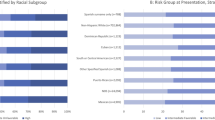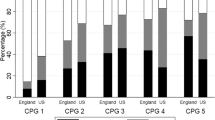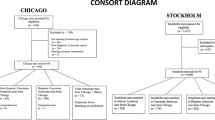Abstract
Background
Historical epidemiological data indicate that Native American patients may have worse prostate cancer (PCa) characteristics than Caucasian patients (CAP). To test for cancer-specific mortality (CSM) differences among Native American vs. CAP, the most contemporary version of the SEER database (Surveillance, Epidemiology, and End Results database [2004−2016]) was used.
Methods
Descriptives and time trend analyses focused on a combined cohort of 357,289 Caucasian and Native American PCa patients of all stages. After 1:4 propensity-score (PS) matching for stage, grade, and other patient characteristics, cumulative incidence plots, and competing-risks-regression-models (CRR) were used, with further stratification according to non-metastatic (TanyN0M0) vs. metastatic (TanyN1 and/or M1) stages.
Results
Native American patients accounted for 1804 (0.5%) of the study cohort. Native American patients had higher PSA (8 ng/ml vs. 6.3 ng/ml), higher rate of D’Amico high-risk PCa (30.8 vs. 24.8%), higher rate of T3/T4-PCa (5.5 vs. 3.7%), higher rate of N1 stage (4.5 vs. 2.8%), and higher rate of M1 stage (7.5 vs. 3.9%, all p < 0.001) than CAP. In TanyN0M0 patients after PS-matching, 10-year CSM was 5.7 vs. 6.2% in Native American vs. CAP. In TanyN1 and/or M1 patients, 10-year CSM was 64.3 vs. 63.3% in Native American vs. CAP, (both p = 0.8). In CRR, Native American race did not represent an independent predictor of CSM.
Conclusions
Native American patients have more unfavorable stage and grade at presentation. However, after adjustment for these characteristics, CSM in Native American patients is not higher than in CAP. In consequence, PCa prognosis does not differ between Native American and Caucasian race. Therefore, efforts should be made to diagnose PCa in Native Americans at an earlier and more favorable stage like in CAP.
This is a preview of subscription content, access via your institution
Access options
Subscribe to this journal
Receive 4 print issues and online access
$259.00 per year
only $64.75 per issue
Buy this article
- Purchase on Springer Link
- Instant access to full article PDF
Prices may be subject to local taxes which are calculated during checkout



Similar content being viewed by others
References
Cronin KA, Lake AJ, Scott S, Sherman RL, Noone AM, Howlader N, et al. Annual Report to the Nation on the Status of Cancer, part i: national cancer statistics. Cancer. 2018;124:2785–800.
Emerson MA, Banegas MP, Chawla N, Achacoso N, Alexeeff SE, Adams AS, et al. Disparities in prostate, lung, breast, and colorectal cancer survival and comorbidity status among Urban American Indians and Alaskan Natives. Cancer Res. 2017;77:6770–6.
Espey DK, Jim MA, Cobb N, Bartholomew M, Becker T, Haverkamp D, et al. Leading causes of death and all-cause mortality in American Indians and Alaska Natives. Am J Public Health. 2014;104 Suppl 3:S303–11.
Clegg LX, Li FP, Hankey BF, Chu K, Edwards BK. Cancer survival among US whites and minorities: a SEER (surveillance, epidemiology, and end results) program population-based study. Arch Intern Med. 2002;162:1985–93.
Javid SH, Varghese TK, Morris AM, Porter MP, He H, Buchwald D, et al. Guideline-concordant cancer care and survival among American Indian/Alaskan Native patients. Cancer. 2014;120:2183–90.
Nash SH, Meisner ALW, Zimpelman GL, Barry M, Wiggins CL. Cancer survival among Alaska Native people. Cancer. 2018;124:2570–7.
Dess RT, Hartman HE, Mahal BA, Soni PD, Jackson WC, Cooperberg MR, et al. Association of black race with prostate cancer-specific and other-cause mortality. JAMA Oncol. 2019;5:975–83.
Krimphove MJ, Cole AP, Fletcher SA, Harmouch SS, Berg S, Lipsitz SR, et al. Evaluation of the contribution of demographics, access to health care, treatment, and tumor characteristics to racial differences in survival of advanced prostate cancer. Prostate Cancer Prostatic Dis. 2019;22:125–36.
Howlader N, Noone A, Krapcho M, Miller D, Brest A, Yu M, et al. SEER cancer statistics review, 1975–2016. Bethesda, MD: National Cancer Institute; 2018. Based on November 2018 SEER data submission, posted to the SEER web site, April 2019.
Epstein JI, Zelefsky MJ, Sjoberg DD, Nelson JB, Egevad L, Magi-Galluzzi C, et al. A contemporary prostate cancer grading system: a validated alternative to the gleason score. Eur Urol. 2016;69:428–35.
Bernard B, Muralidhar V, Chen YH, Sridhar SS, Mitchell EP, Pettaway CA, et al. Impact of ethnicity on the outcome of men with metastatic, hormone-sensitive prostate cancer. Cancer. 2017;123:1536–44.
White MC, Espey DK, Swan J, Wiggins CL, Eheman C, Kaur JS. Disparities in cancer mortality and incidence among American Indians and Alaska Natives in the United States. Am J Public Health. 2014;104 Suppl 3:S377–87.
Henderson JA, Espey DK, Jim MA, German RR, Shaw KM, Hoffman RM. Prostate cancer incidence among American Indian and Alaska Native men, US, 1999–2004. Cancer 2008;113:1203–12.
Goins RT, Schure MB, Noonan C, Buchwald D. Prostate cancer screening among American Indians and Alaska natives: the health and retirement survey, 1996–2008. Preventing Chronic Dis. 2015;12:E123.
Hoffman RM, Li J, Henderson JA, Ajani UA, Wiggins C. Prostate cancer deaths and incident cases among American Indian/Alaska Native men, 1999–2009. Am J Public Health. 2014;104 Suppl 3:S439–45.
Adams SV, Bansal A, Burnett-Hartman AN, Cohen SA, Karnopp A, Warren-Mears V, et al. Cancer treatment delays in American Indians and Alaska Natives enrolled in medicare. J Health Care Poor Underserved. 2017;28:350–61.
Blue Bird Jernigan V, Peercy M, Branam D, Saunkeah B, Wharton D, Winkleby M, et al. Beyond health equity: achieving wellness within American Indian and Alaska Native communities. Am J Public Health. 2015;105 Suppl 3):S376–9.
Wiggins CL, Espey DK, Wingo PA, Kaur JS, Wilson RT, Swan J, et al. Cancer among American Indians and Alaska Natives in the United States, 1999–2004. Cancer. 2008;113:1142–52.
Espey DK, Jim MA, Richards TB, Begay C, Haverkamp D, Roberts D. Methods for improving the quality and completeness of mortality data for American Indians and Alaska Natives. Am J Public Health. 2014;104 Suppl 3:S286–94.
Jim MA, Arias E, Seneca DS, Hoopes MJ, Jim CC, Johnson NJ, et al. Racial misclassification of American Indians and Alaska Natives by Indian Health service contract health service delivery area. Am J Public health. 2014;104 Suppl 3:S295–302.
Author information
Authors and Affiliations
Corresponding author
Ethics declarations
Conflict of interest
The authors declare that they have no conflict of interest.
Additional information
Publisher’s note Springer Nature remains neutral with regard to jurisdictional claims in published maps and institutional affiliations.
Rights and permissions
About this article
Cite this article
Deuker, M., Knipper, S., Pecoraro, A. et al. Prostate cancer characteristics and cancer-specific mortality of Native American patients. Prostate Cancer Prostatic Dis 23, 277–285 (2020). https://doi.org/10.1038/s41391-019-0184-8
Received:
Revised:
Accepted:
Published:
Issue Date:
DOI: https://doi.org/10.1038/s41391-019-0184-8
This article is cited by
-
The impact of race on survival in metastatic prostate cancer: a systematic literature review
Prostate Cancer and Prostatic Diseases (2023)
-
American Indian/Alaska Native men are less likely to receive prostate-specific antigen testing and digital rectal exams from primary care providers than White men: a secondary analysis of the National Ambulatory Medical Care Survey from 2012–2018
Cancer Causes & Control (2023)



